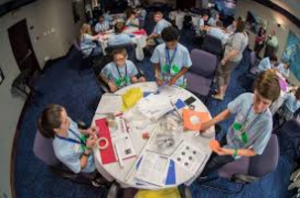By Nigel Hilton
The engineering industry is one of the fastest growing out there, and there are so many great job opportunities for people with the necessary qualifications. Employees in the engineering sector are amongst the highest paid in the country with an average entry level salary of $57,591. Civil engineering is one of the best areas to get into. Although it’s hard work getting there, it’ll definitely be worth it. There are so many different avenues into the engineering trade so whatever your situation, you should be able to find work. However, the competition is fierce out there and you’ll have to make yourself stand out from the crowd if you want to land that dream job. If you’re considering a move into the engineering industry, here are your routes in.

Add to Flipboard Magazine.
Source
Get Qualified
Unfortunately, there isn’t really a shortcut into the engineering industry. You’ll have to put the time in if you want to get the necessary qualifications. The majority of people go to a four-year college to get the degree that they need, which is why engineering has become one of the most popular majors out there. The better the college that you attend, the easier it will be to get a job in future so really your hard work needs to start before you apply for college. MIT is the best college out there so you should be aiming for that, but other places like the University of California and the University of Illinois are both good contenders. Once you’ve completed your four years, you’ve made a good start but there are so many others out there with the same qualifications, it’s the extras that will land you that job.
Start Early
If you wait until you’ve finished college before you start thinking about job applications, you’ll already be behind. Crafting a brilliant CV and job application takes a lot of work so you need to start working on it early on. If you apply for a job with a CV that has your degree and not much else on it, you’re not likely to get to the interview stage, let alone land yourself a job. Most employers like to see extracurricular activities that demonstrate valuable skills. Leading an engineering club for schools in the area is a great way to show that you have a passion for your field, as well as good interpersonal skills. The 4-H organization offers a wide range of outreach programs for kids, one of which is based on science and engineering. They work with over 100 universities across America so it is likely that you’ll be able to volunteer. Not only does it look good on your CV, it’s also a great opportunity to push the engineering industry forward and help shape the next generation of innovators. The Afterschool Alliance is another organization offering similar programs if your university doesn’t work with 4-H.

If you can’t find any relevant volunteering programs in the area, don’t give up. Start your own. Reach out to local schools and other authorities and gather a few of your peers from college to create your own opportunities. It will have all of the benefits of working with an existing group, but it will also show good leadership and organizational skills.
Once you start adding these extra-curricular activities to your CV, it will look a lot healthier and you’ve got a higher chance of getting your foot in the door.
Learn Beyond Your Degree
In your four years at college, you’ll learn a lot of the basics, but there isn’t time to teach you everything. Anybody that’s serious about getting a job as a civil engineer needs to keep up to date with the latest software and ensure that they know how to use it. When it comes to applying for jobs, this will be a huge advantage because it means that your new employer won’t have to dedicate as much time to training if they give you the job. This is going to put you streets ahead of your less knowledgeable competitors.
3D Modelling software is going to be one of the most important weapons in your engineering arsenal, so you need to know it inside out. You will have learned some at college, but there’s always ways that you can improve. HEC-RAS is one of the best pieces of 3D modeling software out there at the moment so it’s worth buying a copy and making yourself familiar with it. There are plenty of online tutorials that you can go through at home to really improve your skills.
If you’re particularly interested in structural design, then you should be looking into STAAD Pro. It’s the most common structural design software in use at the moment and so you won’t be relevant in your field if you can’t use it.
Microsoft Excel doesn’t seem like the kind of high-level software that engineers are going to be using, however, it plays an important role in the planning stages of most engineering projects. You’re probably thinking that you already know how to use Excel, and you’re right. Most people know the basics, but there are a huge amount of advanced features in there.
Pricing is another integral part of the planning process, especially if you are a civil engineer working for a government organization. CCS Candy software is the leading program that engineers use to cost projects. When you’re interviewing, you want to be able to show that you are knowledgeable about all aspects of the civil engineering trade, right from planning and costing, all the way up to design and construction. By learning all of these programs, you can add them to your CV and match up to some of your more experienced competitors.
Get Some Experience
The biggest complaint amongst college graduates entering the job market is the focus on job experience. Employers are asking for a decent amount of experience, but when you’ve been at college for four years when are you supposed to get the chance to work in your chosen field? While a lack of experience can be a hurdle, there are ways that you can get some during your college years.

You aren’t going to land a full-time position but you can always use your summers to get some work experience. Some universities include a one-year placement as part of the degree. This is your best chance to move into full-time work because you get a whole year of real job experience and if you do well, you’ll make valuable connections that you can capitalize on once you’ve finished your degree.
If you’re attending a college that doesn’t offer a year long placement, don’t give up hope. You can find your own summer placements out there, however, lots of them still ask for some kind of experience. That means you’re going to need to be proactive. Get in touch with any local engineering firms and ask if you can come in for a few days just to see how things work. This should make it easier for you to land a placement and get the experience you need.
Network
It’s not what you know, it’s who you know. It may be an old cliche, but it’s true. When employers are sifting through massive amounts of job applications, they’re more likely to pick out people that have made the effort to get out there and meet them over somebody that they’ve never heard of. The American Society Of Engineers puts on regular conferences which are a great place to meet industry leaders and potential employers. You should be able to get into some of these conferences through the university so speak to your department about it.


Recent Comments